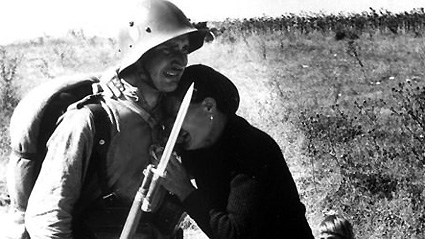 6
6
“There they come, glorious and dignified, into the land of Golden Dobruja – our battle cars: tanks. The people are jubilant, waving their hands in the air. The picture of these huge crawling monsters of steel is glorious and spectacular. Dear listeners, today you’ve heard our final broadcast from newly liberated Dobruja. More than 15 days of joyful manifestations here have shown that Dobruja is the sacred Bulgarian land where the foundations of the First Bulgarian Kingdom were laid. Dobruja has always been and will remain the cradle of the Bulgarian people and every step we take in it bears the imprint of our glorious past, of our revival, of our vitality and our bright future. Here, in Dobruja lie the guarantees of our safety to the North; it is the Pantheon of our past glory..."
A treaty was signed on 7 September 1940 in the Romanian town of Craiova, by force of which Romania returned Southern Dobruja to the Kingdom of Bulgaria.
What was the so-called Dobruja issue, which emerged after the end of the 1877 – 1878 Russo–Turkish War? At the time Russia offered Northern Dorbuja to Romania, in order to compensate it for the loss of South Bessarabia, revoked under the Paris Treaty. The Romanians rejected the idea. the reason - Dobruja was inhabited primarily by Bulgarians, Turks and Tatars, and that make it an arena of conflict between Bulgaria and Romania. Nonetheless, the Berlin Treaty reduced Bulgaria’s territories, giving them to its neighbors.
During the Second Balkan War, while the Bulgarian army fought against its former allies, the Romanian troops penetrated into the Bulgarian lands and in 1913 Southern Dobrudja was incorporated into Romania. This state of affairs would be go on until 1940.
It was only by force of the Thessaloniki Agreement – the first revision of the Treaty of Neuilly-sur-Seine, under which the military restrictions, imposed on Bulgaria were lifted, that there was a chance for the return of the lost territory. After the start of WWII and the altered political situation in Europe due to the German offensive on the Western Front, 1940 proved to be a crucial year for the issue. On September 7, after German and Italian pressure was put on Romania, the Craiova Treaty was signed, which returned Southern Dobruja to Bulgaria.
Thus the 1878 borders were restored. The exchange of an equal number of Bulgarian settlers from the northern parts and Romanian ones from Southern Dobruja was envisaged within three months. The Bulgarian settlers from Northern Dobruja were allowed to take with them only what they could carry, with the exception of gold. It was only after 2-3 years of destitution that the hard-working people from Northern Dobruja were back on their feet again.
Bulgaria also had to pay a compensation of 1 bln. lei for the Romanian property in Southern Dobruja, but that financial injustice meant nothing to the people. On September 21 they welcomed the Bulgarian troops.
“The return of Southern Dobruja is a huge success for Bulgarian diplomacy and for Tsar Boris III himself. In these times of war Bulgaria succeeded in getting back a territory without a single shot fired and with no blood spilt. This is the only Bulgarian acquisition gained thanks to the policy of peaceful revisionism between the two world wars. It is due to this fact that Southern Dobruja remained within the bounds of Bulgaria after WWII – unlike Vardar and Aegean Macedonia or Western Thrace.”
English version: Zhivko Stanchev
Photos: archiveOn 25 January, 1935, Tsar Boris III signed the decree by force of which the Bulgarian National Radio was created. The man appointed head of broadcasting and first director of Radio Sofia, as it was then called, was Panayot Todorov..
“I am not at all fond of the word “legend”, I am a down-to-earth person and an artist. But if I would have to say something about it, it would be “I was recognized as the best basso cantabile in the world.” These words are from one..
2013 went down in the most modern history of Bulgaria as the year of protest. It was the protests that brought down the first GERB cabinet of PM Boyko Borissov, while the term of office of the bipartisan Bulgarian Socialist Party-Movement..

+359 2 9336 661
